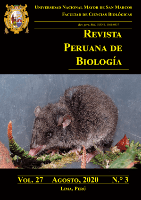
REVISTA PERUANA DE BIOLOGIA
Scope & Guideline
Connecting Researchers to the Heart of Biological Discovery
Introduction
Aims and Scopes
- Biodiversity and Conservation:
The journal covers studies related to the diversity of flora and fauna, including taxonomic revisions, new species descriptions, and assessments of conservation status for various organisms in Peru and surrounding areas. - Ecological Studies:
Research on ecological interactions, habitat assessments, and the impact of environmental changes on biodiversity are key focuses, highlighting the importance of ecosystems in the Andean and Amazonian regions. - Genetic and Molecular Biology:
The journal includes studies employing genetic techniques to understand species diversity, genetic structure, and evolutionary relationships among organisms, with applications in conservation biology. - Environmental Impact Assessments:
Papers often address the effects of human activities on biodiversity, including studies on habitat destruction, invasive species, and pollution, promoting awareness of environmental conservation. - Ethnobiology and Human-Wildlife Interactions:
The journal features research that explores the relationships between local human communities and their natural environments, including the use of biological resources and traditional knowledge.
Trending and Emerging
- Climate Change and Biodiversity:
There is a growing emphasis on studying the impacts of climate change on biodiversity, including species distribution shifts, habitat loss, and adaptations, reflecting global environmental concerns. - Conservation Genetics:
Research applying genetic tools to assess and enhance conservation strategies is on the rise, focusing on the genetic health of endangered species and the management of genetic diversity. - Invasive Species Studies:
An increasing number of papers are addressing the threats posed by invasive species to local ecosystems, highlighting the need for effective management and mitigation strategies. - Human-Wildlife Conflicts:
Studies exploring the interactions and conflicts between human populations and wildlife are becoming more common, emphasizing the importance of sustainable coexistence and community engagement. - Microbial Ecology and Bioprospecting:
Research on microbial diversity and its applications in biotechnology, such as bioremediation and sustainable agriculture, is gaining traction, reflecting an interest in harnessing natural resources for innovative solutions.
Declining or Waning
- Traditional Taxonomic Studies:
As molecular and genomic methods gain popularity, traditional taxonomic approaches seem to be receiving less attention, with fewer studies solely focused on morphological descriptions without genetic analysis. - General Ecological Surveys:
While ecological studies remain important, there appears to be a decline in broad ecological surveys without specific research questions, as more targeted studies on specific species or ecosystems become prevalent. - Agricultural Biodiversity Research:
Research focusing on agricultural biodiversity and its direct applications in farming practices is less frequent, possibly due to a shift towards more conservation-oriented studies.
Similar Journals

REVUE SUISSE DE ZOOLOGIE
Connecting Ecology, Evolution, and BehaviorThe REVUE SUISSE DE ZOOLOGIE, published by the esteemed MUSEUM HISTOIRE NATURELLE, is a premier journal dedicated to advancing the field of zoology and its related disciplines. Established in 1964, this Swiss journal has consistently provided a platform for high-quality research in the areas of ecology, evolution, behavior, and systematics, currently holding a commendable Q3 ranking in these categories for 2023. With a rich publication history spanning from 1964 to 1979 and then from 1994 to the present, it serves not only as a significant repository of knowledge but also as a crucial resource for researchers, professionals, and students alike. While the journal is not open access, it remains a vital tool for those wishing to stay at the forefront of zoological research and innovation. Its commitment to disseminating groundbreaking studies makes it an indispensable asset for academic institutions and researchers globally, ensuring that pivotal findings in zoology continue to gain visibility and impact.
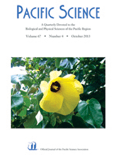
PACIFIC SCIENCE
Bridging Disciplines for a Deeper Understanding of the PacificPACIFIC SCIENCE is a prestigious multidisciplinary journal published by University of Hawaii Press, dedicated to advancing knowledge across diverse fields of study related to the Pacific region. With a robust ISSN of 0030-8870 and an E-ISSN of 1534-6188, this journal serves as a vital platform for researchers, professionals, and students to disseminate and access influential research findings that contribute to the understanding of ecological, cultural, and social dynamics in the Pacific. The journal has steadily maintained its relevance since its inception in 1947 and features a commendable Scopus Rank of #74 out of 171 in the multidisciplinarity category, placing it in the 57th percentile of its field, and is recognized as having a Q2 quartile ranking in 2023. Although lacking open access options, PACIFIC SCIENCE offers in-depth analysis and scholarly discourse, effectively bridging various disciplines to foster collaboration and innovation. With its commitment to high-quality research and its significant impact on Pacific studies, the journal continues to play an important role in informing policy, conservation efforts, and community engagement within this vital region.

NACC-Nova Acta Cientifica Compostelana Bioloxia
Empowering Researchers to Transform Biological Understanding.NACC-Nova Acta Cientifica Compostelana Bioloxia is a pivotal academic journal published by the University of Santiago de Compostela, dedicated to advancing knowledge in the field of biological sciences. With an ISSN of 1130-9717 and an E-ISSN of 2340-0021, this journal serves as a vital platform for researchers and professionals to disseminate their findings and collaborate on key issues within the discipline. Although it currently does not offer an open access model, its relevance is underscored by its commitment to high-quality scientific rigor, making it an essential resource for students, academics, and practitioners alike. The journal aims to promote innovative research and foster the exchange of ideas in biological studies, contributing significantly to the academic community's understanding of a diverse range of biological phenomena. Its headquarters are located at the Servicio de Publicaciones e Intercambio Cientifico, Campus Univ Sur, Santiago de Compostela 15782, Spain, emphasizing its strong European roots and commitment to empowering researchers.
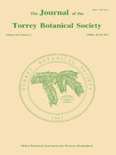
JOURNAL OF THE TORREY BOTANICAL SOCIETY
Unlocking the secrets of the natural world through botanical insights.JOURNAL OF THE TORREY BOTANICAL SOCIETY is a prominent academic journal dedicated to advancing the fields of botany and ecology, published by the esteemed TORREY BOTANICAL SOCIETY. With an ISSN of 1095-5674 and an E-ISSN of 1940-0616, this journal serves as a critical platform for researchers, professionals, and students to share their findings and insights. Despite its status in the Q4 category for the 2023 rankings across Ecology, Plant Science, and Ecology, Evolution, Behavior and Systematics, the journal continues to foster significant discourse and collaboration in the botanical sciences, aiming to elevate the understanding of plant biology and ecosystems. Its open access options enhance accessibility, ensuring that groundbreaking research reaches a wider audience. Published in the United States, the journal features work from both established scientists and emerging scholars, making it a vital resource for anyone involved in the study of plants and their environmental interactions. Explore the JOURNAL OF THE TORREY BOTANICAL SOCIETY to engage with cutting-edge research and contribute to the ongoing dialogue in the botanical sciences.
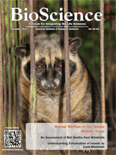
BIOSCIENCE
Exploring the depths of life sciences since 1972.BIOSCIENCE, published by Oxford University Press, is a leading journal in the field of Agricultural and Biological Sciences, recognized for its rigorous peer-reviewed articles and innovative research contributions. With an impressive impact factor that places it in the Q1 quartile of its category, BIOSCIENCE ranks #7 out of 221 journals in its field, representing the top 3% of publications based on Scopus data. Since its inception in 1972, it has provided a platform for the dissemination of knowledge and advancement in various biological domains, making it an essential resource for researchers, professionals, and students dedicated to the life sciences. The journal does not currently offer open access options, yet its comprehensive coverage—from cellular biology to ecosystem dynamics—ensures it remains a pivotal reference for ongoing biological studies and developments. Readers can find its latest issues through the ISSN 0006-3568 or E-ISSN 1525-3244, ensuring broad accessibility to its impactful content.

Diversity-Basel
Pioneering research that bridges the gap between science and sustainability.Diversity-Basel is a premier open-access journal published by MDPI, specializing in the vital fields of agricultural, biological, and ecological sciences. Launched in 2009, this multidisciplinary journal, operating from Switzerland, aims to disseminate high-quality research that advances the understanding of biodiversity and ecosystem dynamics. With an impressive impact factor and notable rankings in Scopus, including Q1 classification in Agricultural and Biological Sciences and strong positions in Ecology and Ecological Modeling, Diversity-Basel stands as a valuable resource for global researchers, professionals, and students alike. Its commitment to accessibility enables researchers to reach a wider audience, fostering collaboration and innovation in addressing pressing environmental challenges. By providing an inclusive platform for diverse scientific inquiries and innovations, Diversity-Basel plays an essential role in shaping the discourse on biodiversity conservation and management, encouraging the pursuit of sustainable solutions in our rapidly changing world.
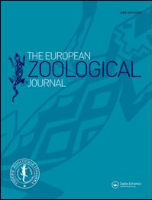
European Zoological Journal
Bridging the Gap Between Research and Ecological SolutionsEuropean Zoological Journal, published by Taylor & Francis Ltd, is an esteemed open-access publication dedicated to advancing the exciting field of zoology. Since its inception in 2017, this journal has progressively established itself as a vital resource for researchers, professionals, and students alike. With its Q2 ranking in Animal Science and Zoology as of 2023, the journal ranks in the 69th percentile among its peers, showcasing its influence and contribution to the discipline. The journal’s broad scope covers a wide range of topics within zoology, aiming to foster an understanding of animal biology and conservation efforts. As an open-access journal, it not only enhances the dissemination of knowledge but also encourages collaborative research across global communities. Situated in the United Kingdom, the European Zoological Journal invites submissions that contribute to the evolving discourse in animal sciences, and endeavors to support the scientific community in addressing pressing ecological challenges.
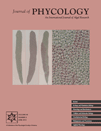
JOURNAL OF PHYCOLOGY
Connecting Scholars with Cutting-edge Phycological ResearchJOURNAL OF PHYCOLOGY, published by Wiley, is a premier academic journal dedicated to the realms of Aquatic Science and Plant Science. Established in 1965, it has continuously contributed to the advancement of phycology through rigorous research and scholarly discussions. The journal holds an impressive reputation, classified as Q1 in both aquatic and plant sciences for 2023, affirming its position among the top-tier journals in these fields. With a Scopus ranking of 31 out of 247 in Aquatic Science and 75 out of 516 in Plant Science, it stands in the 87th and 85th percentiles respectively, highlighting its influence and impact. While it is not an open access journal, it offers a wealth of valuable insights and original research articles that are essential for researchers, professionals, and students alike. The JOURNAL OF PHYCOLOGY is a critical platform for the dissemination of knowledge on both fundamental and applied aspects of algae, making it indispensable for those who seek to deepen their understanding of this crucial area of biological science.

Tropical Life Sciences Research
Unveiling Innovations in Tropical Life SciencesTropical Life Sciences Research, published by PENERBIT UNIVERSITI SAINS MALAYSIA, is an esteemed open-access journal dedicated to the realms of Agricultural and Biological Sciences, Biochemistry, Genetics, and Molecular Biology, and Medicine. Since its inception in 2006, this journal has established itself as a significant platform for disseminating high-quality research findings that contribute to the understanding of tropical biodiversity and health-related issues. With its innovative approach, Tropical Life Sciences Research has garnered an impressive impact factor, reflecting its influence in the academic community; it is ranked Q2 in Agricultural and Biological Sciences and Q3 in both Biochemistry and Medicine categories as of 2023. Researchers and professionals can access a wealth of knowledge through this journal, whose content spans from 2009 to 2024, making it a vital resource for students and experts alike interested in advancing the science of tropical ecosystems and health. The journal also stands out for its comprehensive Scopus rankings, indicating its relevance and quality in the competitive academic landscape.

Czech Polar Reports
Fostering Dialogue on Environmental ChallengesCzech Polar Reports, published by Masaryk University Press, is a pivotal academic journal dedicated to advancing research in the realms of Agricultural and Biological Sciences, Earth and Planetary Sciences, and Environmental Science. Since its inception in 2014, this peer-reviewed journal has established a solid reputation as a medium for disseminating innovative research, particularly in the unique environmental contexts of polar regions. With an impressive Q3 ranking in its designated categories by 2023, Czech Polar Reports serves as a valuable resource for researchers, professionals, and students seeking to deepen their understanding of ecological and climatic changes in these critical areas. While the journal is not fully Open Access, it aims to contribute substantially to ongoing scholarly dialogues and provide insights that are essential for sustainability and climate action. The journal's commitment to fostering interdisciplinary research underscores its importance in a rapidly evolving scientific landscape.